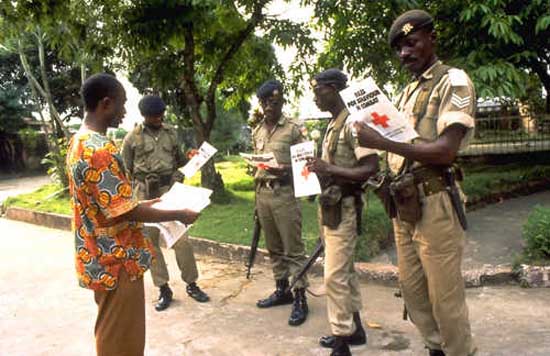
Christienne Durbin worked in Liberia as a Peace Corps Volunteer during the early stages of the civil war. Now back in America with the international humanitarian group, Direct Relief, Durbin recalls the early fight to create awareness about the deadly virus that is now posing a threat to nation recovering from war.
Still a Taboo in So Many Ways': Direct Relief Worker Christienne Durbin Recalls the Early Days of HIV Aids During Her Stay in Liberia
Liberian Observer (Monrovia)
June 22, 2005
Posted to the web June 22, 2005
Rodney D. Sieh
Christienne Durbin worked in Liberia during the early stages of the civil war. Now back in America with the international humanitarian group, Direct Relief, Durbin recalls the early fight to create awareness about the deadly virus that is now posing a threat to nation recovering from war.
Christienne Durbin was in the midst of Liberia just about the time everything was about to break loose. The AIDS virus was unknown or much relegated to mythical theories and ignorance as a civil war was about to unfold.
http://www.africacncl.org/CCA_Summits/2005_reg/step1.aspx
It was the New Years Eve of 1989, Charles Taylor's rebel movement, the National Patriotic Front of Liberia had served notice that they were for real with the invasion of Liberia through Nimba County.
"I was in the Peace Corps before. During the era of the war I worked in Bassa as a primary health care supervisor and conducted a lot of HIV AIDS education and spread the word about how it is transmitted, how to protect oneself, safely destroying needles etc. "It wasn't really prevalent but it was starting to develop. The people weren't necessarily resistant to the message, it was just something that we had to teach over and over again, to get them used to thinking about it," says Durbin.
Durbin, now 42, recalls her enthusiasm about getting ready to begin working with Liberians and helping to educate them about the spread of the HIV AIDS virus.
Empowerment is key
"It also depends on the empowerment of women. They don't have the power to tell their partners to use condoms and become a bit more self-sufficient and demand that the bodies be respected. Men are stuck in roles they think they have to play. Being a man means taking care of your communities and taking care of yourself."
"AIDS is still a Taboo in so many Ways," she says. "We need to try to let people understand that they have the power in themselves to do something about reducing the rate of infection in their own communities. Uganda is a good example of what can happen when governments and people are open about the subject of HIV. From a high of about 30% in some areas, the current HIV infection rate in Uganda is between 5-7%, though that is too high! Still, Uganda has been at the forefront of organizing a coordinated, effective response to the HIV virus."
"Everyone wants their kids to be healthy and go to school and have a long, bright future. Do it for your kids."
She says Malaria, was also a big problem. "My health education training taught me how to prevent malaria which was and still is one of the major killers of children in Africa. But the HIV AIDS epidemic was just starting. There were also cases of women dying in childbirth.
At the time she says the government was actively involved in helping work with locals to prevent and educate about the spread of the HIV AIDS virus.
"I participated in the activities and events centered around World AIDS Day. The government did a lot to try to sponsor outreach programs.
"The clinic where I worked was founded by residents of Buchanan who wrote their own grants and built the clinics by themselves. There was a lot of input from Liberians to help in the improvement of their health. We in the Peace Corps were able to provide support for them. To be a support for the local people, she says.
Prevention and education about the AIDS virus she says has to be something that everyone is involved with. "The most successful models for prevention and outreach is to educate community leaders, so that people in their own communities can help their peers. The message has to come from the elders, women, students and leaders. They are the ones who can put the message out there about how the disease spreads and how it can be stopped. That's really the way it has to be done," she says.
Health Supervision
It was long before many had even began to take the rapidly spreading disease seriously and just two years before basketball star Magic Johnson announced he had the virus that many began to take notice. Durbin worked as an HIV AIDS Health Educator with the Peace Corps and as a public health official in the United States before joining Direct Relief International. She is one of two program officers for Africa and also administers Direct Relief's domestic program for vulnerable populations.
In Liberia, she was responsible for supervising a health clinic for children under five years of age, provided health classes on nutrition, AIDS, sanitation, breast-feeding, and birth control, organized clinic vaccination campaigns, on-going and with national campaigns as well as team supervised with nurse practitioner and a physician's assistant
Today, she works as a Program officer for Direct Relief International in eastern and southern Africa: but is still involved with Liberia, in collaboration with Project Momentum.
"Making sure that shipments arrive on time and that they reach the neediest populations. All shipments that leave our warehouse are in response to an expressed need for the products they contain, identified by trained and competent health care professionals on the ground," she says.
"Direct Relief is so very fortunate to have Christienne Durbin inform our organization's thinking and activities. From personal experience, she knows the challenges that people in Liberia confront every day - through no fault of their own - and she is committed to working to provide assistance that makes sense and is sensitive to the local circumstances," says Thomas Tighe, International President for Direct Relief. "Beginning with her Peace Corps service in Liberia, Christienne's professional activities have been focused on helping lift people up when they need help," Tighe says. Tighe says Durbin's strong public health background and a deep personal connection to the Liberian people enhance the quality of what Direct Relief International does in Liberia and the other African countries to which she is our principal liaison.
For Durbin, the work never ends.
"Two of the primary goals of our strategic plan include a deeper focus on HIV/AIDS and Maternal and Child Health issues. This is in accordance with United Nations Millennium Development Goals, 4, 5, 6 to reduce Child Mortality, Improve Maternal Health, and Combat HIV AIDS, Malaria and other disease," she says.
Direct Relief
Since 2001 DRI has supplied 24 facilities around the world who maintained a primary or secondary focus on HIV AIDS. While we do work on a global level, much of our current focus has been concentrated in Sub-Saharan Africa. For example we provide to our local health partners the broad-spectrum anti-infectives needed for treating life-threatening Acute Respiratory Infections (ARI's commonly found in developing countries. People Living With AIDS are particularly vulnerable to a variety of infections which are easily treatable with these drugs.
"The need to ensure that children receive the care they need to stay alive and be healthy. One of the most effective ways to improve health and well-being of pre and post partum women and their babies is the presence of trained birth attendants to assist with the normal delivery and to recognize when complications have developed so that the baby can be safely delivered in a facility equipped to handle such emergencies, says Durbin.
"Our focus at direct relief is HIV. We actually provide to our local health partners. They need to ensure that women and children," says Durbin.
Too Many Women die
Besides the AIDS awareness initiative, Durbin was also involved in teaching and helping Liberians cope and deal with various diseases. She says it is important to provide basic medical care, community health education, and products such as prenatal and children's vitamins in order to keep and make communities healthy as well as helping to prevent and treat measles, malaria, malnutrition and Diarrhea. "Vitamins are can integral part of the well-being of the body, especially in situations where people are malnourished and stricken with disease.
Durbin laments the fact that too many women died because of ruptured uterus because ante-and post partum hemorrhage are not recognized on time. "We are now working with partners who are training birth attendants to provide pregnant women with safe deliveries. Our role is to provide the pre-natal vitamins adult and children's vitamins and midwife kits.
More than 600, 000 women die annually of pregnancy-related complications, 99 percent of them in developing countries like Liberia. There is a hundred-fold difference in lifetime risk of dying during pregnancy between the world's poorest and richest countries. The major cause of maternal deaths are preventable with basic care, medical supplies, and referral systems. Similarly, it is estimated that up to 70 percent of all newborn deaths are preventable.
Nearly 11 million children die each year before they reach the age of five, mostly from diseases that can be easily prevented.
Of her time in Liberia she says: "I was really quite moved that I was going to be a part of history. It was a really moving experience. Liberia has a very special place in my heart."
'Conspiracy Against Africa'
The AIDS topic she says was much of a taboo subject for many. "People didn't want to hear about it, even the Americo-Liberians, at the time people thought it was a conspiracy against Africa. It's a lot to do with personal things. People said, Oh you're just trying to blame us for this when it was something that was put on us by outside forces," says Durbin.
Durbin says even if it is something that is outside of you, You still have a role to play. At the beginning people just didn't know about it.
Durbin says in terms of prevention and education, it really needs to have the local people involved in spreading the message. "It also depends on the empowerment of women. They don't have the power to tell their partners to use condoms and become a bit more self-sufficient and demand that their bodies be respected. Men are stuck in roles they think they have to play. Being a man means taking care of your communities and taking care of yourself."
Direct Relief has been actively involved in complementing the work of Liberians in the fight against the HIV virus. "In terms of HIV, we can provide the anti-infectives that help suppressed immune systems to fight opportunistic infections. Our partners might provide the care and treatment, what we can provide is some of the necessary medicines, medical material, and personal care items that contribute to the care of patients." says Durbin.
Durbin says she was happy to hear that the Group of Eight nations have forgiven the debts of many African countries. "HIV AIDS just took a toll on the economies and therefore the healthcare systems. "Just to pay that debt every year affected the fight against AIDS for most of these countries," she says. "If we can provide them with some of the medicines they need. then that's more money that they can focus on something else in their health care system."












